Is Your Antivirus Really Protecting You? Find Out Now
Last Updated:
Quick Heal, Trend Micro, Kaspersky, Panda – even well-known antiviruses are surprisingly poor at detecting malware offline (as low as 44% in the worst cases).
Meanwhile, market leaders like AVG and Avast have a history of collecting and selling user data.
This begs the question – can you really trust your antivirus? Is it actually protecting you, or are you just paying for a false sense of security?
Allow me to clear up all such concerns with this article.
I’ll help you understand the main threats to worry about in 2024, how to evaluate your current protection, and how to stay safe.
Understanding Antiviruses – Why Do You Need One?
Antiviruses detect, block, and remove malware like viruses and worms from a system. They constantly monitor the system for threats based on the latest database of known threats.
Besides real-time protection, antivirus suites provide extra security benefits like:
- Ransomware protection
- Phishing protection
- Web protection
- VPN
- Firewall for network security
- Quarantine and sandbox features
- Email protection and spam/ad blockers
- Identity theft and fraud protection
- Public Wi-Fi Protection
- Brute Force Protection
- Advanced anti-theft
- Webcam spying and hacker protection
- Hack alerts, password breach checking, and more
These features are great and all, but are they actually necessary?
To answer that, let me show you some real-world stats and reports. They’ll explain what kind of threats most people are facing these days.
These Are the Most Common Threats in 2024
- Ransomware
- According to the FBI’s 2022 Internet Crime Report, the IC3 received 2,385 complaints identified as ransomware with adjusted losses of more than $34.3 million.
- The SANS Institute reviewed data from eCrime.ch (a prominent threat intelligence group) and found that ransomware attacks increased by nearly 73% from 2022 to 2023.
- Other Malware
- SocGholish, ArechClient2, CoinMiner, Lumma Stealer, Pegasus – the top cybersecurity threats in 2024 range from RATs and worms to spyware. Varied as ever.
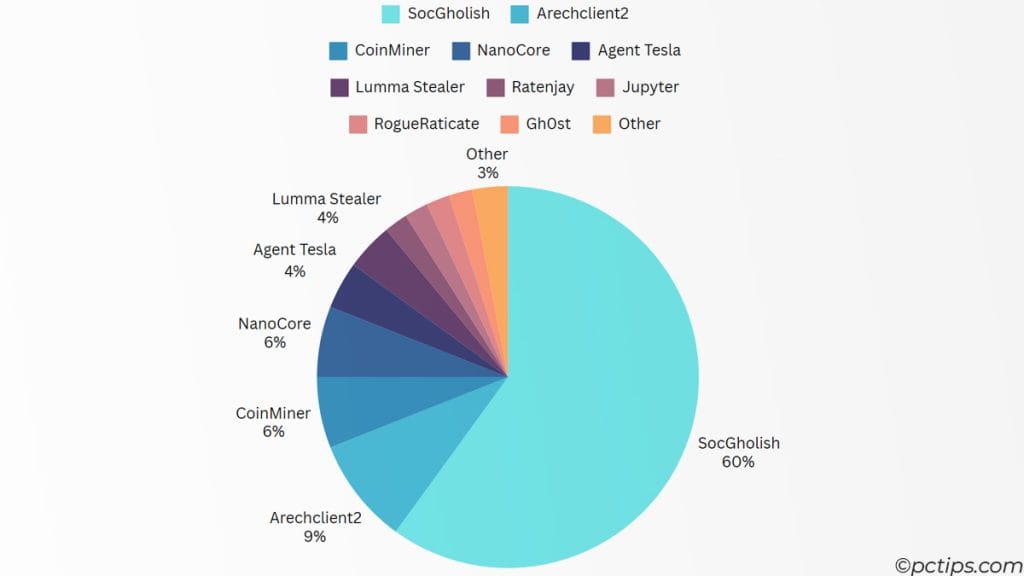
- Phishing
- According to the FBI’s 2023 Internet Crime Report, phishing has been the #1 most reported crime for the last 5 years (almost 300k cases in 2023).
- The Anti-Phishing Working Group observed almost 5 million phishing attacks in 2023 – the worst in history.
- Data Breach & Fraud
- 2023 saw a record-high number of data compromises that impacted at least 353 million people.
- Consequently, the FTC data book showed over 2.6 million fraud reports and $10 billion reported lost in 2023.
- Misc
- Verizon’s DBIR 2024 showed that 68% of breaches involved a human element (falling for social engineering, inadvertently leaking sensitive data – often by emailing the wrong person, neglecting security best practices, etc).
Are You Really At Risk Of These Threats?
Despite all this data, some of you might be thinking that you’re not at risk.
These hackers and viruses, surely they’ll target large businesses and organizations instead of going after one random person, right?
Let me make it clear – cybercriminals do not discriminate!
You can look as far back as the ILOVEYOU worm from two decades ago. The creator didn’t intend it to be malicious but it still ended up affecting over 10 million PCs.
Or, you can look at recent history. The WannaCry attacks from 2017 affected over 150 countries.
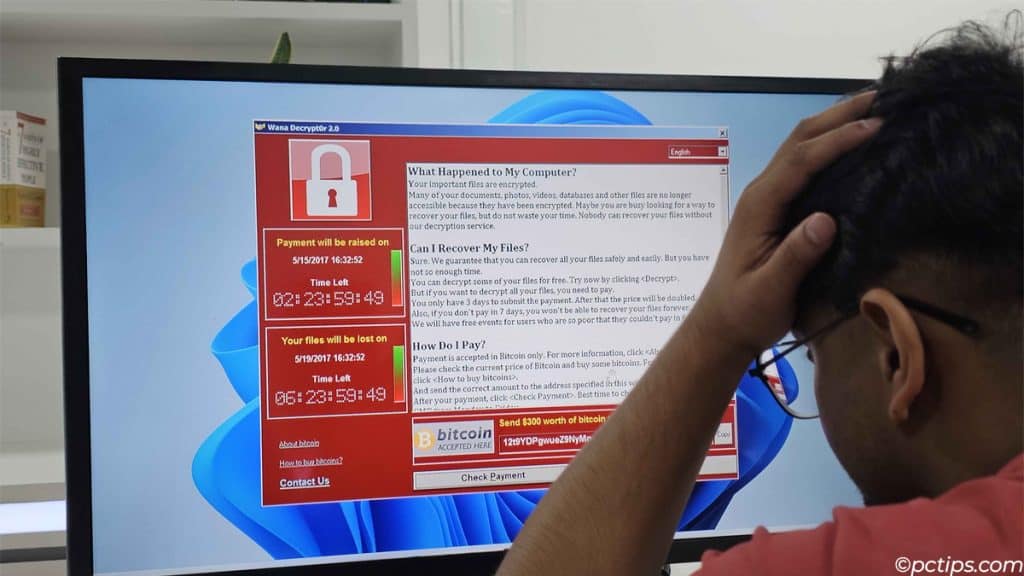
Hospitals, auto manufacturers, telecommunication, e-commerce, transport, small businesses, individuals – EVERYONE was affected.
Some of my close friends have fallen victim to ransomware in the past. Chances are, you likely know some victims of fraud or malware too.
Please do not take such threats lightly. Your private data and finances could be easily impacted if you’re careless.
How Effective is YOUR Antivirus?
Hopefully, I’ve convinced you to evaluate whether your antivirus is actually capable of keeping you safe.
Not all antiviruses are created equal.
So, use the following factors to compare different ones and decide whether yours is good enough:
These are the Safest Antiviruses
According to reputed independent testers AV-comparatives.org,
- Antiviruses like Bitdefender, F-Secure, Avast, Windows Defender, etc all boast protection stats close to 100%. You’ll be safe with any of those.
- What you must avoid are AVs like Trend Micro, Quick Heal, Panda, etc. These have the lowest detection and protection rates and the most false positives.
Check Protection History on Your PC
Lab tests aren’t everything. Think back on your own experiences with your current antivirus too.
- Check the protection history and see how many threats it has protected you from so far.
- Verify whether it frequently quarantines safe files and raises false alarms or not.
- Can you recall any instances of malware infections despite using the antivirus?
And so on.
What Does ‘Security’ Encompass
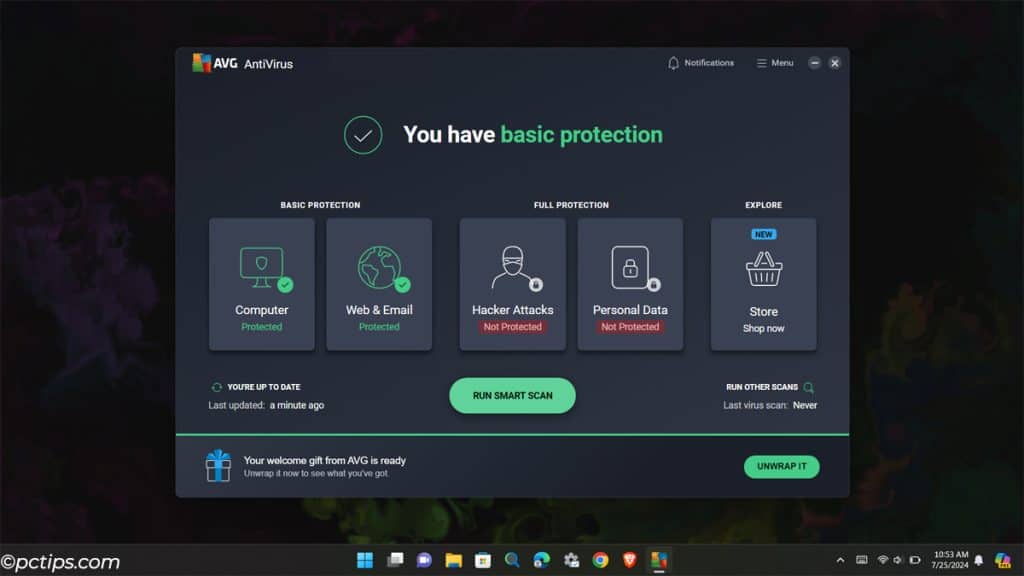
Real-time malware protection is key, but don’t discount other features too.
- How well does Web Protection work?
- Does the Browser Guard block ads and trackers properly?
- Has the AV ever blocked legitimately harmful websites from opening?
- Has it ever blocked harmful files from downloading?
- Do you frequently travel? Can your AV keep you safe?
- Does it provide a dedicated Public Wi-Fi Protection feature?
- Does it provide a VPN? Is it reliable? Has it been independently audited to ensure your data isn’t collected?
- Does the AV provide ransomware protection?
- Have you tested it to make sure it encrypts/backups your files properly? How have other people fared with it; any failures?
- Does it keep backups of protected files on its own servers? Can you trust that?
- Is the antivirus for older people who may be prone to new styles of fraud?
- Does it have email spam protection?
- Does it have phishing protection?
- How good is the scam and fraud protection?
You get the idea.
Ideally, your antivirus should have all the security features you need and protect you well against your main threats.
Look for These Infection Signs
And the ultimate judge of whether your antivirus is good enough – is your PC infected?
- Is your PC slow?
- Constant crashes?
- Pop-ups everywhere?
- Settings you didn’t change
- Programs you didn’t install
- Internet is terribly slow
- You’re locked out of your PC
- You can’t access your data
No such signs on your PC? Then, your antivirus might be doing a good job.
But if you notice multiple signs, your PC may be compromised. Act fast!
What to Do If Your PC Is Infected
If your PC is already infected, there are only a few things you can do:
- Make sure your antivirus is up-to-date so that it has access to the latest virus definitions.
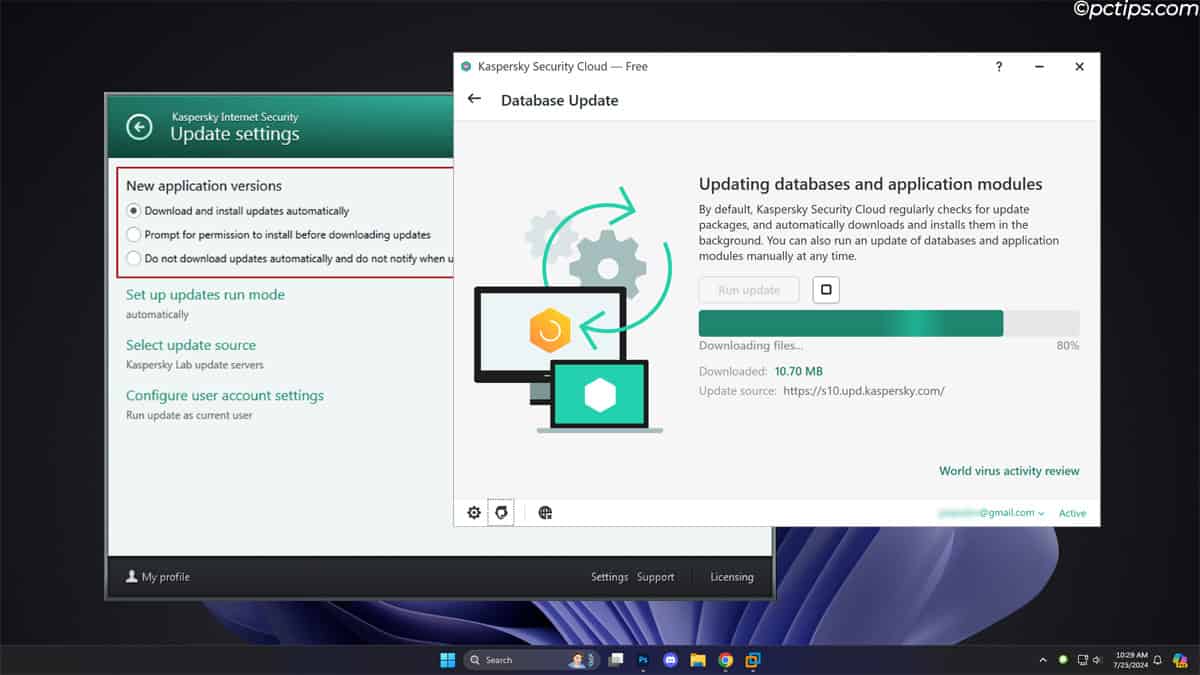
- Run a full system scan with your antivirus and remove all detected malware.
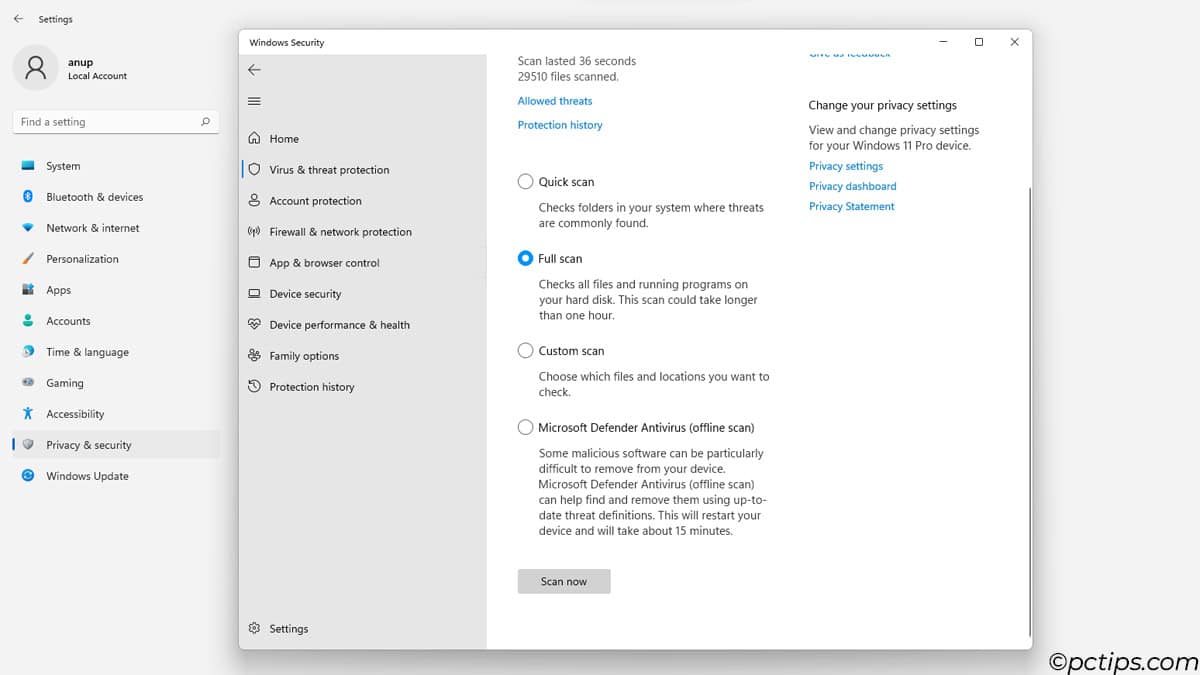
- If needed, use specialized tools for your exact malware infection (e.g., Kaspersky’s noransom decryptors).
- In severe cases, create an antivirus rescue disk, boot from it, and perform a scan.
- If all else fails, backup your critical files to an empty spare drive. Then, format your PC completely and clean-install Windows.
Set Up Antivirus For Complete Protection
What do you do after wiping everything and reinstalling Windows?
Read up on security best practices and common mistakes to ensure you never get compromised again.
A big part of this is setting up your antivirus suite properly. Take Windows Defender, for instance.
Search “security” and open the Windows Security app. Or go to:
- Windows 11: Settings > Privacy & security > Open Windows Security
- Windows 10: Settings > Update & Security > Windows Security
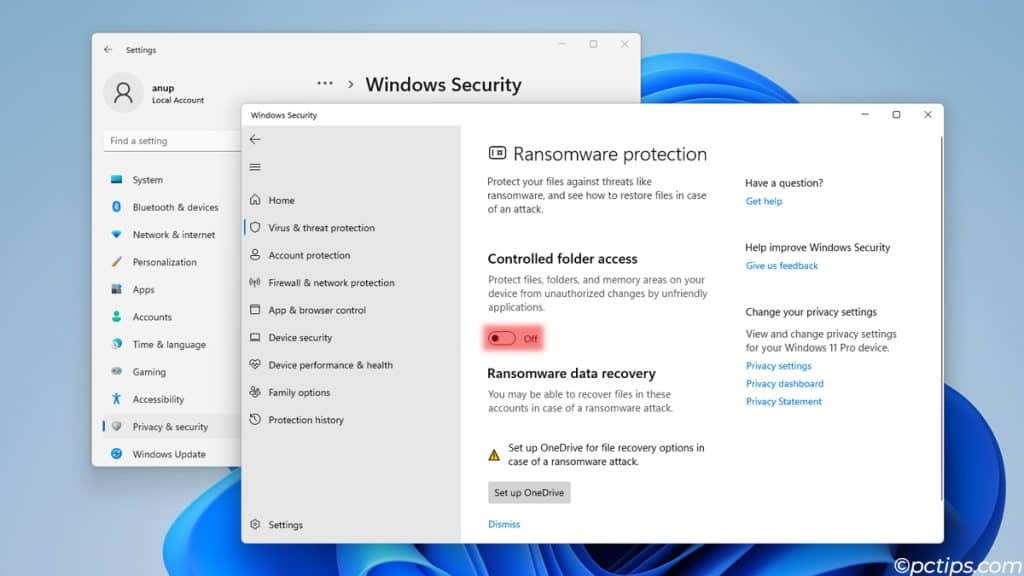
You’ll find that various important features like ransomware data recovery, controlled folder access, reputation-based protection, memory integrity, etc are OFF by default.
Whatever antivirus you’re using, go through all the settings or find a good guide online. Make sure you’re utilizing all available security features and protected against different threats.
Here’s What Your Antivirus DOESN’T Protect Against
Antiviruses are extremely important for security but don’t forget that they’re just one part of a greater puzzle.
New threats are emerging constantly and there are some attack vectors AVs are useless against:
Zero-day Exploits
These attacks exploit vulnerabilities that developers are not yet aware of (meaning no record or fix exists yet).
Since AVs react and protect you based on a list of known threats, they’re not good at dealing with such attacks based on unknown security flaws.
Most AVs do provide some form of behavioral analysis (proactively detect potential threats by monitoring the behavior of programs in real time). However, its effectiveness is ultimately limited.
One well-known example is the Stuxnet worm that exploited four different 0-day vulnerabilities in Windows. It affected over 2,00,000 PCs and caused major damage to Iran’s nuclear program.
AI-powered Threats
AI-generated polymorphic malware, convincing phishing attacks with generative AI, deepfake attacks, automated botnets, and so on – traditional antiviruses are not equipped to deal with AI-driven cyberattacks.
Fileless Attacks
Fileless attacks use exploit kits, stolen credentials, registry or memory-resident malware, etc to hijack legitimate built-in tools.
Since no external code or tools are installed, these attacks are very hard to detect with antiviruses alone.
You might recall the Equifax breach of 2017 that exposed the personal details of around 147 million people.
Ransomware
If ransomware like WannaCry or CryptoLocker has already encrypted your data, it’s near-impossible to get that data back, even with the help of data recovery experts and specialized anti-ransomware tools.
Social Engineering
Phishing, pretexting, baiting, impersonation, CEO fraud, watering hole attacks, tech support scams, etc – these are vectors where attackers exploit human error rather than software flaws.
There are thousands of well-known cases:
- The 2016 US Presidential Election email Leaks
- The 400k Shark Tank email scam
- The 2020 Twitter Bitcoin scam
- The $100 Million Google and Facebook phishing scam
An antivirus can potentially warn you about suspicious websites, attachments, scam patterns in emails, etc. But it can’t directly protect you against social engineering.
This is something you must stay vigilant against yourself.
Should You Pay for Antivirus Protection?
Free vs paid antiviruses – does it matter? Does paying for premium protection keep you safer from the aforementioned threats?
For most people, it makes no difference.
In enterprise settings, premium security solutions are essential and make large-scale management easier.
But for an average user, a good free antivirus will provide all the features and protection you need.
In fact, you don’t even need to bother with a third-party antivirus:
- Microsoft Defender is built-in to Windows.
- It’s unintrusive and light on resources.
- Extra configuration is simple and minimal.
- It doesn’t raise many false alarms.
- It’s proven to have one of the highest malware protection rates (99.94%).
Is Safety All That Matters In An Antivirus?
Safety is the main goal, but is that all you should look for in an antivirus?
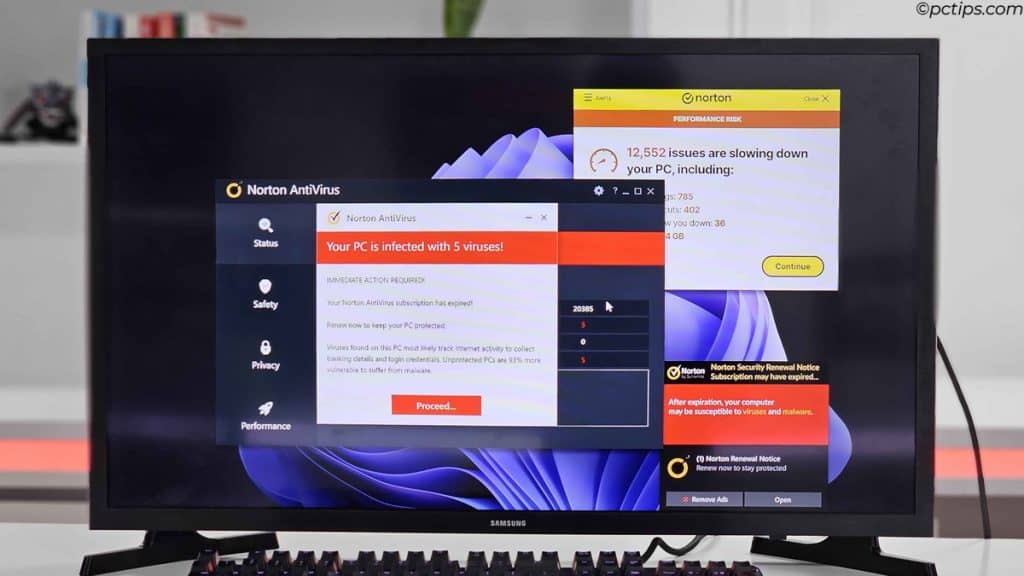
I recommend considering other factors too, like:
- Rate of false positives (safe files that antivirus mistakenly flags or removes)
- System impact (memory consumption, file transfer speed, time to install and open apps, network speed, etc)
- Intrusiveness (constant pop-ups and ads nagging you to upgrade to premium)
- Trust (what’s their track record like; are they collecting and selling your data?)
AVs like Norton, McAfee, AVG, and Avast have great protection rates but they’re awful in terms of other metrics. You can probably understand now why I recommend Windows Defender over them.
Do You Absolutely Need An Antivirus?
To sum up: Do you really need an antivirus? Is it actually protecting you?
Yes, an antivirus is essential.
From malware and phishing scams to ransomware, I’ve talked in detail about the threats you’d be exposed to without an antivirus.
Even a reliable free one will do, just have one active!
As for how effective your antivirus is, I’ve explained ways to evaluate that too.
Remember – Prevention is Key
The last thing to remember is: even with the best antivirus, you’re not immune to threats.
Security is complex, and threats are constantly evolving. AVs should just be one layer in a larger model, rather than your only form of protection.
Always follow safety best practices:
- Don’t open shady links. Don’t open files you don’t trust.
- Be cautious about social engineering when sharing sensitive info.
- Use complex and unique passwords.
- Use 2FA to lock down your online accounts.
- Protect yourself with a VPN on public networks.
- Keep offline backups with the 3-2-1 method. This will protect you from a range of problems including drive failure and ransomware.
- Keep your OS and antivirus updated to stay safe from the latest threats.
Essentially, avoid being an easy target for attackers. Minimizing the chances of you being attacked is much better than dealing with the aftermath.
If you have any questions or need further advice with anything, drop a comment below.
Stay safe!
Thanks for all of your tips and help, your Awesome 👍
Glad to be of help, Troy!